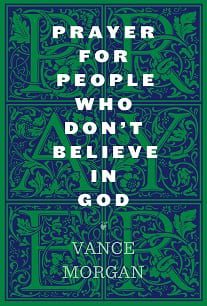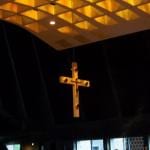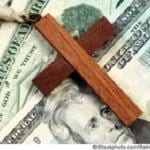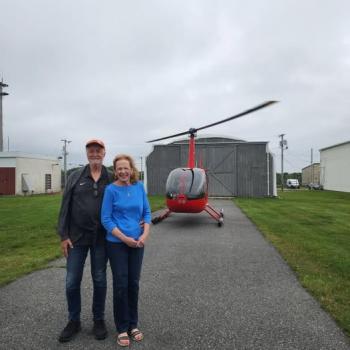 I am pleased to announce that my new book, Prayer for People Who Don’t Believe in God, will be released by Wood Lake Publishing on Tuesday, October 1. The promotional materials describe my book as an exploration of How prayer has power for those who are opening themselves to the “possibility of God.” This book is steeped in the ideas and issues that I engage with regularly in this blog. You will be able to find information about how to order my new book on my “Publications” page as soon as it is released.
I am pleased to announce that my new book, Prayer for People Who Don’t Believe in God, will be released by Wood Lake Publishing on Tuesday, October 1. The promotional materials describe my book as an exploration of How prayer has power for those who are opening themselves to the “possibility of God.” This book is steeped in the ideas and issues that I engage with regularly in this blog. You will be able to find information about how to order my new book on my “Publications” page as soon as it is released.
To whet your appetite, here is an excerpt from Chapter Two (“Prayer Is Not for Experts”).
Excerpt from Prayer for People Who Don’t Believe in God (Wood Lake Publishing)
In her spiritual memoir Still, Lauren Winner tells the story of a conversation between poet Anne Sexton and a Catholic priest who came to visit her while she was in a mental health facility. The title of Sexton’s eighth collection of poems, The Awful Rowing Toward God, reportedly came from this conversation. The collection was published a few months after she committed suicide.
Anne began the conversation by letting the priest know that he was probably wasting his time: “Well, I’ve lost it all.” In response, he sat for a time and read her poems aloud to her. Their subsequent conversation went something like this:
Anne: “Look, I’m not sure I believe in God, anyway.”
Priest: “Your typewriter is your altar.”
Anne: “I can’t go to church. I can’t pray.”
Priest: “Your poems are your prayers.”
Later in the conversation, Sexton said that she would like the priest to baptize her, after which she would like to take communion. Falling into his official role, the priest gives Anne the party line: before she can be baptized and take communion, she would first have to study the faith tradition, the councils, the creeds, and more.
“I can’t do that, Father,” Anne replied. “It would ruin my thinking: I’d want Him to be my God, anyway. I don’t want to be taught about Him; I want to make Him up.”
As the priest was leaving, Anne asked him to pray for her. “No,” he replied. “You pray for me.”
The “expert” clearly recognized something holy in the troubled poet, something that cuts across traditional conceptions of prayer and more. Reflecting on this story, Winner observes that Sexton is insisting that “she has the right to be on the terrain of the sacred,” even though by all measures she has not “earned” that right in any traditional sense. In Anne Sexton’s estimation, Winner writes, “the sacred must answer to her private experience of reality – the only sacred on which she can stand is a sacred that makes some kind of sense in her actual life…not some imagined life or even longed-for life but this here real actual life, hers.” For Anne Sexton, and for each of us, prayer invites the divine into our lives, not as a distant, untouchable temporary visitor, but as a holiness that is adaptable to each experience and each life. For Sexton, “the sacred must change shape to meet her, not just she bend and fold to fit on holy ground.”
The story of Anne Sexton and the priest reminds me of a similar encounter between a spiritually powerful woman who was a person standing just outside the edges of traditional religion, and a Catholic priest. Simone Weil, a 20th-century Jewish social activist, philosopher, and mystic whom we will encounter more fully in a later chapter, exchanged several lengthy letters with a Dominican priest friend, letters in which she expressed both her close-to-obsessive desire for God and her equally strong reluctance to align herself with any specific religious tradition. For Weil, even the thought of prayer in any traditional or organized sense was problematic, because formal prayer contains a significant power of suggestion – the very words we use unfailingly create a sketch of what we think the divine is.
All such sketches, in Weil’s estimation, place limits on one’s search for the divine. Weil insisted that, whatever or whoever God is, searching for the divine requires the unfettered use of all of our capacities, as she describes in this memorable passage from one of her letters:
It seemed to me certain, and I still think so today, that one can never wrestle enough with God if one does so out of pure regard for the truth. Christ likes us to prefer the truth to him, because before being Christ, he is truth. If one turns aside from him to go toward the truth, one will not go far before falling into his arms.
There is a fearlessness in this passage that is rooted in one simple insight: God is big enough to handle all of our good-faith attempts to engage in conversation with what is greater than us – there are no “experts” in this endeavour. Weil elaborates on this fearless willingness to pursue the truth and face reality, without consoling stories, in one of her most important essays, “The Love of God and Affliction.”
They alone will see God who prefer to recognize the truth and die, instead of living a long and happy existence in a state of illusion. One must want to go towards reality; then, when one thinks one has found a corpse, one meets an angel who says: “He is risen.”













